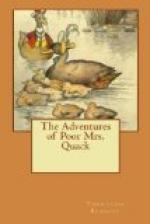“I guess you would, and that is just what we would do, if we didn’t take the long journey south when Jack Frost freezes everything tight up there where my home is,” returned Mrs. Quack. “He comes earlier up there and stays twice as long as he does here, and makes ten times as much ice and snow. We get most of our food in the water or in the mud under the water, as of course you know, and when the water is frozen, there isn’t a scrap of anything we can get to eat. We just have to come south. It isn’t because we want to, but because we must! There is nothing else for us to do.”
“Then I don’t see what you want to make your home in such a place for,” said practical Peter. “I should think you would make it where you can live all the year around.”
“I was born up there, and I love it just as you love the dear Old Briar-patch,” replied Mrs. Quack simply. “It is home, and there is no place like home. Besides, it is a very beautiful and a very wonderful place in summer. There is everything that Ducks and Geese love. We have all we want of the food we love best. Everywhere is shallow water with tall grass growing in it.”
“Huh!” interrupted Peter, “I wouldn’t think much of a place like that.” “That’s because you don’t know what is good,” snapped Jerry Muskrat. “It would suit me,” he added, with shining eyes.
“There are the dearest little islands just made for safe nesting-places,” continued Mrs. Quack, without heeding the interruptions. “And the days are long, and it is easy to hide, and there is nothing to fear, for two-legged creatures with terrible guns never come there.”
“If there is nothing to fear, why do you care about places to hide?” demanded Peter.
“Well, of course, we have enemies, just as you do here, but they are natural enemies,—Foxes and Minks and Hawks and Owls,” explained Mrs. Quack. “Of course, we have to watch out for them and have places where we can hide from them, but it is our wits against their wits, and it is our own fault if we get caught. That is perfectly fair, so we don’t mind that. It is only men who are not fair. They don’t know what fairness is.”
Peter nodded that he understood, and Mrs. Quack went on. “Last summer Mr. Quack and I had our nest on the dearest little island, and no one found it. First we had twelve eggs, and then twelve of the dearest babies you ever saw.” “Maybe,” said Peter doubtfully, thinking of his own babies.
“They grew so fast that by the time the cold weather came, they were as big as their father and mother,” continued Mrs. Quack. “And they were smart, too. They had learned how to take care of themselves just as well as I could. I certainly was proud of that family. But now I don’t know where one of them is.”
Mrs. Quack suddenly choked up with grief, and Peter Rabbit politely turned his head away.




